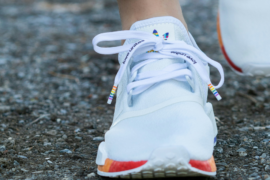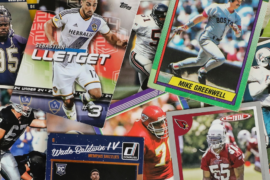As kids we played football in the school parking lot, tearing our jeans, and bloodying our elbows on the uneven asphalt, pretending to be Black NFL players. I was my hero, Barry Sanders. I loved how he could make men 3x his size look silly by juking through their bricky feet or lull them off balance before blasting through their flailing arms. He was my first favorite artist. Every time he touched the ball it was original.
At night I’d flip through Sports Illustrated and wish I was Black. It wasn’t written that someone had to be Black to play professional football. But the evidence was overwhelming. The only white players were stiff-legged quarterbacks and offensive lineman. I wanted to dance through defenders with the ball. Be electric. Only two white running backs have ever rushed for over 1000 yards in NFL history. Barry Sanders did it 10 times alone. Black players were the only visible version of my dream. None of us knew how to want to be astronauts or presidents. Those dreams were obscure to the children of railroad workers and after it closed, former railroad workers. But we did feel entitled to be Black. When we stopped growing six inches too soon, football became harder to imagine as an escape route. But as our dreams of gridiron glory faded, the taking never did.
We started listening to Tupac and Outkast and DMX. It pissed off our parents and felt different in a world that had already become stifling. There was something inherently alive about this music which pushed against the static world our parents represented. We made the language of those songs into our own and nobody told us it wasn’t ours. Whatever we thought rap’s look was, mostly baggy pants and oversized hoodies, we took as well. I heard ****** from white, real-world mouths and it felt wrong, but nobody stopped each other. Rap became whatever we wanted, bending its context to fit our needs. We were evacuated from our homes twice a summer while the police cleared meth labs in our neighborhoods, lost in the world of our headphones without knowing where to turn. So, we kept taking until we found ourselves in high school. Football and rap had felt like escape hatches, but as we aged, and our dreams dimmed, our taking turned into something fouler. Angrier.
More Black families started moving to our small rural town around this time. We were told they came for affordable housing and let that answer become the entirety of their experience. A sense of protectiveness came over us as the space we felt was ours became a possibility for others. And with limited ways to articulate that anger and an unwillingness to complicate the narratives around our own existence, our defensiveness came out as the racial slurs our country teaches us. People said, ****** in a new way, at people instead of with the lyrics in a song, and my stomach would tighten while everyone laughed or nodded, depending on the tone.
As teens we saw ourselves as trapped. Stuck in the two-mile loop we endlessly cruised in our asthmatic cars. Through the shuttered downtown, around the outskirts of empty trainyard infrastructure, past empty paint-flaking homes. Again and again, we’d circle this middle of nowhere space, eroding the tread on our tires on the same potted roads, not feeling like we belonged anywhere. Our town was in flyover country. We saw it as an isolated, cultural blank space, but nowhere is blank. In that void, whiteness was not only the norm but an unnamed morality. One which needed to be protected.
Adults talked about affirmative action and political correctness like insults. They complained loudly about how nobody had ever helped them. Teaching us to find evidence of the world out to get us. Which in some ways it was. Because the world is out to get most of us. Unsurprisingly, it became a Trump stronghold (60+%). Trump weaponized this entitlement by encouraging how sorry we felt for ourselves for having to share what we thought we owned. What we considered white. Even though all the rivers and creeks had Native American names.
The irony of this victimhood, was a group of little kids pretending to be Black so we had a chance at something graspable. Not the typical American dream which felt so far away, but something different, which inspired us. That inspiration, however, didn’t teach us to discover something new. The artistry of these Black athletes didn’t open the world because our whiteness entitled us to believe we deserved what they had. Our own positionality as victims blocking any self-reflection. And taking from them never even crossed our minds.
MICHAEL HARPER is a MFA candidate at the University of Idaho. Previously he taught kindergarten. His most recent work has appeared or is forthcoming in Ninth Letter, Hobart, Fugue, Terrain.org, The Las Angeles Review, and others.
Like what you’re reading?
Get new stories, sports musings, or book reviews sent to your inbox. Drop your email below to start >>>
NEW book release
Direct Connection by Laura Farmer. Order the book of stories of which Mike Meginnis says there is “an admirable simplicity at their heart: an absolute, unwavering confidence in the necessity of loving other people.”
GET THE BOOK



